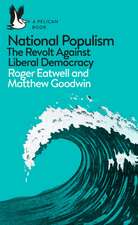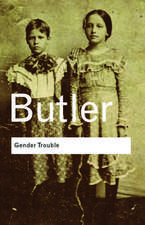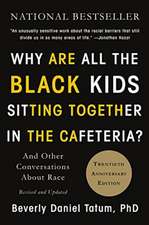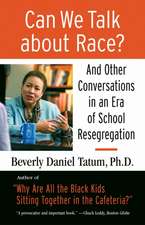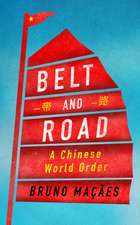Covering: The Hidden Assault on Our Civil Rights
Autor Kenji Yoshinoen Limba Engleză Paperback – 28 feb 2007
Vezi toate premiile Carte premiată
Triangle Awards (2007)
Everyone covers. To cover is to downplay a disfavored trait so as to blend into the mainstream. Because all of us possess stigmatized attributes, we all encounter pressure to cover in our daily lives. Given its pervasiveness, we may experience this pressure to be a simple fact of social life.
Against conventional understanding, Kenji Yoshino argues that the demand to cover can pose a hidden threat to our civil rights. Though we have come to some consensus against penalizing people for differences based on race, sex, sexual orientation, religion, and disability, we still routinely deny equal treatment to people who refuse to downplay differences along these lines. Racial minorities are pressed to “act white” by changing their names, languages, or cultural practices. Women are told to “play like men” at work. Gays are asked not to engage in public displays of same-sex affection. The devout are instructed to minimize expressions of faith, and individuals with disabilities are urged to conceal the paraphernalia that permit them to function. In a wide-ranging analysis, Yoshino demonstrates that American civil rights law has generally ignored the threat posed by these covering demands. With passion and rigor, he shows that the work of civil rights will not be complete until it attends to the harms of coerced conformity.
At the same time, Yoshino is responsive to the American exasperation with identity politics, which often seems like an endless parade of groups asking for state and social solicitude. He observes that the ubiquity of the covering demand provides an opportunity to lift civil rights into a higher, more universal register. Since we all experience the covering demand, we can all make common cause around a new civil rights paradigm based on our desire for authenticity–a desire that brings us together rather than driving us apart.
Yoshino’s argument draws deeply on his personal experiences as a gay Asian American. He follows the Romantics in his belief that if a human life is described with enough particularity, the universal will speak through it. The result is a work that combines one of the most moving memoirs written in years with a landmark manifesto on the civil rights of the future.
“This brilliantly argued and engaging book does two things at once, and it does them both astonishingly well. First, it's a finely grained memoir of young man’s struggles to come to terms with his sexuality, and second, it's a powerful argument for a whole new way of thinking about civil rights and how our society deals with difference. This book challenges us all to confront our own unacknowledged biases, and it demands that we take seriously the idea that there are many different ways to be human. Kenji Yoshino is the face and the voice of the new civil rights.” -Barbara Ehrenreich, author of Nickel and Dimed
“Kenji Yoshino has not only given us an important, compelling new way to understand civil rights law, a major accomplishment in itself, but with great bravery and honesty, he has forged his argument from the cauldron of his own experience. In clear, lyrical prose, Covering quite literally brings the law to life. The result is a book about our
public and private selves as convincing to the spirit as it is to the
mind.” -Adam Haslett, author of You Are Not A Stranger Here
“Kenji Yoshino's work is often moving and always clarifying. Covering elaborates an original, arresting account of identity and authenticity in American culture.”
-Anthony Appiah, author of The Ethics of Identity and Laurance S. Rockefeller University Professor Of Philosophy at Princeton University
“This stunning book introduces three faces of the remarkable Kenji Yoshino: a writer of poetic beauty; a soul of rare reflectivity and decency; and a brilliant lawyer and scholar, passionately committed to uncovering human rights. Like W.E.B. DuBois's The Souls of Black Folk and Betty Friedan's The Feminine Mystique, this book fearlessly blends gripping narrative with insightful analysis to further the cause of human emancipation. And like those classics, it should explode into America's consciousness.”
-Harold Hongju Koh Dean, Yale Law School and former Assistant Secretary of State for Human Rights
“Covering is a magnificent work - so eloquently and powerfully written I literally could not put it down. Sweeping in breadth, brilliantly argued, and filled with insight, humor, and erudition, it offers a fundamentally new perspective on civil rights and discrimination law. This extraordinary book is many things at once: an intensely moving personal memoir; a breathtaking historical and cultural synthesis of assimilation and American equality law; an explosive new paradigm for transcending the morass of identity politics; and in parts, pure poetry. No one interested in civil rights, sexuality, discrimination - or simply human flourishing - can afford to miss it.”
-Amy Chua, author of World on Fire
“In this stunning, original book, Kenji Yoshino demonstrates that the struggle for gay rights is not only a struggle to liberate gays---it is a struggle to free all of us, straight and gay, male and female, white and black, from the pressures and temptations to cover vital aspects of ourselves and deprive ourselves and others of our full humanity. Yoshino is both poet and lawyer, and by joining an exquisitely observed personal memoir with a historical analysis of civil rights, he shows why gay rights is so controversial at present,
why “covering” is the issue of contention, and why the “covering demand,” universal in application, is the civil rights issue of our time. This is a beautifully written, brilliant and hopeful book, offering a new understanding of what is at stake in our fight for
human rights.”
-Carol Gilligan, author of In a Different Voice
From the Hardcover edition.
Preț: 91.33 lei
Puncte Express: 137
Preț estimativ în valută:
16.15€ • 19.11$ • 14.08£
16.15€ • 19.11$ • 14.08£
Carte disponibilă
Livrare economică 13-27 martie
Specificații
ISBN-13: 9780375760211
ISBN-10: 0375760210
Pagini: 282
Dimensiuni: 127 x 208 x 17 mm
Greutate: 0.21 kg
Editura: Random House Trade
Locul publicării:New York, NY
ISBN-10: 0375760210
Pagini: 282
Dimensiuni: 127 x 208 x 17 mm
Greutate: 0.21 kg
Editura: Random House Trade
Locul publicării:New York, NY
Recenzii
Praise for Covering
“This brilliantly argued and engaging book does two things at once, and it does them both astonishingly well. First, it's a finely grained memoir of young man’s struggles to come to terms with his sexuality, and second, it's a powerful argument for a whole new way of thinking about civil rights and how our society deals with difference. This book challenges us all to confront our own unacknowledged biases, and it demands that we take seriously the idea that there are many different ways to be human. Kenji Yoshino is the face and the voice of the new civil rights.” -Barbara Ehrenreich, author of Nickel and Dimed
“Kenji Yoshino has not only given us an important, compelling new way to understand civil rights law, a major accomplishment in itself, but with great bravery and honesty, he has forged his argument from the cauldron of his own experience. In clear, lyrical prose, Covering quite literally brings the law to life. The result is a book about our
public and private selves as convincing to the spirit as it is to the
mind.” -Adam Haslett, author of You Are Not A Stranger Here
“Kenji Yoshino's work is often moving and always clarifying. Covering elaborates an original, arresting account of identity and authenticity in American culture.”
-Anthony Appiah, author of The Ethics of Identity and Laurance S. Rockefeller University Professor Of Philosophy at Princeton University
“This stunning book introduces three faces of the remarkable Kenji Yoshino: a writer of poetic beauty; a soul of rare reflectivity and decency; and a brilliant lawyer and scholar, passionately committed to uncovering human rights. Like W.E.B. DuBois's The Souls of Black Folk and Betty Friedan's The Feminine Mystique, this book fearlessly blends gripping narrative with insightful analysis to further the cause of human emancipation. And like those classics, it should explode into America's consciousness.”
-Harold Hongju Koh Dean, Yale Law School and former Assistant Secretary of State for Human Rights
“Covering is a magnificent work - so eloquently and powerfully written I literally could not put it down. Sweeping in breadth, brilliantly argued, and filled with insight, humor, and erudition, it offers a fundamentally new perspective on civil rights and discrimination law. This extraordinary book is many things at once: an intensely moving personal memoir; a breathtaking historical and cultural synthesis of assimilation and American equality law; an explosive new paradigm for transcending the morass of identity politics; and in parts, pure poetry. No one interested in civil rights, sexuality, discrimination - or simply human flourishing - can afford to miss it.”
-Amy Chua, author of World on Fire
“In this stunning, original book, Kenji Yoshino demonstrates that the struggle for gay rights is not only a struggle to liberate gays---it is a struggle to free all of us, straight and gay, male and female, white and black, from the pressures and temptations to cover vital aspects of ourselves and deprive ourselves and others of our full humanity. Yoshino is both poet and lawyer, and by joining an exquisitely observed personal memoir with a historical analysis of civil rights, he shows why gay rights is so controversial at present,
why “covering” is the issue of contention, and why the “covering demand,” universal in application, is the civil rights issue of our time. This is a beautifully written, brilliant and hopeful book, offering a new understanding of what is at stake in our fight for
human rights.”
-Carol Gilligan, author of In a Different Voice
From the Hardcover edition.
“This brilliantly argued and engaging book does two things at once, and it does them both astonishingly well. First, it's a finely grained memoir of young man’s struggles to come to terms with his sexuality, and second, it's a powerful argument for a whole new way of thinking about civil rights and how our society deals with difference. This book challenges us all to confront our own unacknowledged biases, and it demands that we take seriously the idea that there are many different ways to be human. Kenji Yoshino is the face and the voice of the new civil rights.” -Barbara Ehrenreich, author of Nickel and Dimed
“Kenji Yoshino has not only given us an important, compelling new way to understand civil rights law, a major accomplishment in itself, but with great bravery and honesty, he has forged his argument from the cauldron of his own experience. In clear, lyrical prose, Covering quite literally brings the law to life. The result is a book about our
public and private selves as convincing to the spirit as it is to the
mind.” -Adam Haslett, author of You Are Not A Stranger Here
“Kenji Yoshino's work is often moving and always clarifying. Covering elaborates an original, arresting account of identity and authenticity in American culture.”
-Anthony Appiah, author of The Ethics of Identity and Laurance S. Rockefeller University Professor Of Philosophy at Princeton University
“This stunning book introduces three faces of the remarkable Kenji Yoshino: a writer of poetic beauty; a soul of rare reflectivity and decency; and a brilliant lawyer and scholar, passionately committed to uncovering human rights. Like W.E.B. DuBois's The Souls of Black Folk and Betty Friedan's The Feminine Mystique, this book fearlessly blends gripping narrative with insightful analysis to further the cause of human emancipation. And like those classics, it should explode into America's consciousness.”
-Harold Hongju Koh Dean, Yale Law School and former Assistant Secretary of State for Human Rights
“Covering is a magnificent work - so eloquently and powerfully written I literally could not put it down. Sweeping in breadth, brilliantly argued, and filled with insight, humor, and erudition, it offers a fundamentally new perspective on civil rights and discrimination law. This extraordinary book is many things at once: an intensely moving personal memoir; a breathtaking historical and cultural synthesis of assimilation and American equality law; an explosive new paradigm for transcending the morass of identity politics; and in parts, pure poetry. No one interested in civil rights, sexuality, discrimination - or simply human flourishing - can afford to miss it.”
-Amy Chua, author of World on Fire
“In this stunning, original book, Kenji Yoshino demonstrates that the struggle for gay rights is not only a struggle to liberate gays---it is a struggle to free all of us, straight and gay, male and female, white and black, from the pressures and temptations to cover vital aspects of ourselves and deprive ourselves and others of our full humanity. Yoshino is both poet and lawyer, and by joining an exquisitely observed personal memoir with a historical analysis of civil rights, he shows why gay rights is so controversial at present,
why “covering” is the issue of contention, and why the “covering demand,” universal in application, is the civil rights issue of our time. This is a beautifully written, brilliant and hopeful book, offering a new understanding of what is at stake in our fight for
human rights.”
-Carol Gilligan, author of In a Different Voice
From the Hardcover edition.
Notă biografică
Kenji Yoshinois the Chief Justice Earl Warren Professor of Constitutional Law at New York University School of Law. A graduate of Yale Law School, where he taught from 1998 to 2008, he is the author ofCovering: The Hidden Assault on Our Civil Rights;A Thousand Times More Fair: What Shakespeare’s Plays Teach Us About Justice;andSpeak Now: Marriage Equality on Trial. Yoshino’s writing has appeared inThe New York Times, The Washington Post,andLos Angeles Times. He lives in New York with his husband and two children.
Extras
AN UNCOVERED SELF
Send the beloved child on a journey,” the Japanese proverb says. So when I turned thirteen, my parents sent me to boarding school. I could see they wished to keep me close, but worried about the effects of tenderness. Small for my age, not so much quiet as silent, I was tarrying at the threshold of adolescence. A singer, I was stricken when my clean boy soprano, that noise only boys can make, broke into a sublunary baritone.
So off I went, to boarding school and radical reinvention. The need for self-reliance called into being a self on which I could rely. As no one knew me there, no one could challenge the authenticity of this brighter self. Seemingly overnight, I became full of speeches, sociable. I have never worked so hard, or been so happily appetitive, as in those years.
Yet physically I remained a small dark thing altogether. I remember thinking during a soccer practice that I must have had a lot of natural muscle once, to feel so punished as I watched those boys scissor the air with their blond high school legs. Their bodies hummed to a frequency not my own as balls sailed fluently into nets. I sensed these bodies knew other bodies, as I knew calculus or Shakespeare. That knowledge flaunted itself in the lilt of small hairs off their necks.
I would not have been able to say I was gay and these others were straight. I knew only I was asked not to be myself, and that to fail to meet that demand was to make myself illegible, my future unimaginable. I hoped time would soften the difference between others and me, but knew it would do the opposite.
To evade my fate, I acquired a girlfriend. I have a memory of my dormitory’s stairwell, where boys would kiss girls good night before curfew. I am standing on the bottom step looking down at her. She is Filipina, a year older, her fluency in French standing for her urbanity. The waver of shadow superimposes an ambivalence on the sweet certainty of her face. I wonder what is more abject than this—my brain urging the bloodrush and attention that comes so naturally, so involuntarily, to others.
Of course, it was not wonderful to be her, either. Yet it was many years before I would speculate about the other side of that kiss. Only after I came out did I listen to the rueful stories of gay men—how one picked fights with his wife to avoid sex, how another wished his girlfriend would turn into a pizza at nightfall. The trials of those who love the closeted have yet to be told. I was nowhere near imagining them then.
My rising anxiety gave me limitless life force in other spheres. I remember a biology lab in which we observed a spear-headed water worm. Like a starfish, it could grow back anything we razored off it, even to the point of generating multiple versions of itself. I saw myself in that gliding shape. Arrow-shaped, it never arrived where it wanted to go. But it knew, when cut, to grow.
As I moved from high school to college, my mill of activity became more frenetic, a way of keeping the world at bay. At Harvard, I took five or six courses a semester, and as many extracurriculars, foreclosing time for thought, for breath. Friends complained I was walled up, a Jericho waiting for its Joshua. Yet alongside my silence was a ravening urge to speak. So I began to study poetry—a childhood passion—more formally, finding solace in a language more public than thought but more private than prose. Instead of writing an analytic thesis to graduate as an English major, I petitioned to write a collection of my own poems.
Writing these poems gave me more pleasure than anything before. That year, the only reason anything had to be, was to be a poem—the icicles making their small clear points on the eaves, the broken gate that clacked double knuckled on its hinge, the bitter flesh star at the heart of a lemon. Poetry was my medium, as rigid and formal and obscure as its author. On Saturday nights, I would sit in my cement-block dorm room with my face lit green by my IBM’s glow, agonizing not over women, or men, but line breaks. I thought myself happy, and in some sense I was.
The readers of my collection understood as much of me as I did. One grader took it on faith: “I cannot see what you have seen. But I can see that you have seen.” The other did not. Impatient, he quoted Marvin Bell’s line about how to become a writer is to become “less and less embarrassed about more and more.”
Neither grader had license to say the collection was hard to read for a different reason: it was full of pain. The collection ends in crisis—the last poem, titled “The Infanticide of My Professions,” was about the selves we had to kill in young adulthood. The word “profession” carried its double sense of façade and occupation. The poem expressed the hope I would destroy the selves I only professed to be, and be left with one with a natural vocation. That hope was smothered by the fear I might murder the real self or, worse, that I might find that self to be a tragic one. I still find this poem difficult to read.
Yet when I wrote it, I acted as if I could carry the world before me. My curricular and extracurricular frenzy had won me a Rhodes scholarship to England. (Perhaps the closeted should not be permitted to compete for these fellowships—we have the advantage of those Saturday nights.) But the carbonation in my veins when I won was less joy than relief. I had a new precocity to balance against my backwardness, this social acceptance to weigh against my refusal of life.
One person saw through me. The poetry professor who had supervised my thesis was a Pre-Raphaelite figure. A whippet-thin chain smoker, she had waist-length auburn hair and eyebrows sharp as circumflex accents. She was the best teacher I have ever had—she returned each poem marked up in three colors, one for each pass she had taken over it. She gave me a nickname: Radiating Naivete. “Radiating Naivete,” she would say when we bumped into each other near midnight at Caffé Paradiso, “have you entered the realm of the erotic yet?” In a letter she gave me at graduation, she described sitting on a plane next to an emergency exit. There was an arc painted next to the handle, each end of which was marked with a scarlet word: “Engage” and “Disengage.” The handle was on “Disengage.” She said it made her think of me.
I was not ready when emergency came. Until then, I had been splendidly noncommittal: neither Japanese nor American, neither poet nor pragmatist, neither straight nor gay. But it seemed all ambiguities had to be resolved that year. I had to choose citizenship—the red Japanese passport or the blue American one, the two colors of blood. I had to choose a career—literature or law. Most of all, I had to choose—or choose to acknowledge—the sexuality that roiled the surface that summer when I fell bewilderingly in love.
The Japanese character for erotic desire is the same as that for color. Some say this commonality arises from the Buddhist teaching that desire, like color, distracts us from enlightenment by calling us to the things of this world. The world’s colorless wave broke kaleidoscopically over me when I met Brian. We lived together after graduation while we attended summer school—he to complete medical school prerequisites, I to prepare for my time in En-gland. Brian was the first in his family to attend college and was, like me, hungry to prove himself. But unlike me, he had directed his intensity outward, devoting his college years to ceaseless public service. This moved me.
One glittering afternoon, we walked along the Charles River. It was a Sunday—the riverside drive was hedged with sawhorses, closed to cars. The cyclists sheared the air. Dazzled by the needles of light stitching the water, I turned to watch him watch them. I noticed his eyelashes were reflected in his eyes, like awnings in windowpanes. As I tried to make sense of that reflection, I found I could not look away. His irises were brown, clouding into orange, with brighter flecks around his pupils. Then it became as important not to look as to look, as I feared I would be lost in a rush of bronze motes.
It hardly mattered that I knew he was straight. I experienced my desire for him, which was a pent-up desire for many men, as having an absolute absolved necessity. Just as the brain seems larger than the skull that contains it, so did my desire seem grossly to exceed the contours of my body. I thought if I could only make him experience the strength of what I felt, he could not demur.
I had, in one sense, chosen the right man. Brian responded with compassion. Yet my desire was now not only thwarted, but exposed. Brian made me acknowledge my knowledge; he made me own myself. I snapped back into my skin. And I felt something in me crack—like a safe, a whip.
From the Hardcover edition.
Send the beloved child on a journey,” the Japanese proverb says. So when I turned thirteen, my parents sent me to boarding school. I could see they wished to keep me close, but worried about the effects of tenderness. Small for my age, not so much quiet as silent, I was tarrying at the threshold of adolescence. A singer, I was stricken when my clean boy soprano, that noise only boys can make, broke into a sublunary baritone.
So off I went, to boarding school and radical reinvention. The need for self-reliance called into being a self on which I could rely. As no one knew me there, no one could challenge the authenticity of this brighter self. Seemingly overnight, I became full of speeches, sociable. I have never worked so hard, or been so happily appetitive, as in those years.
Yet physically I remained a small dark thing altogether. I remember thinking during a soccer practice that I must have had a lot of natural muscle once, to feel so punished as I watched those boys scissor the air with their blond high school legs. Their bodies hummed to a frequency not my own as balls sailed fluently into nets. I sensed these bodies knew other bodies, as I knew calculus or Shakespeare. That knowledge flaunted itself in the lilt of small hairs off their necks.
I would not have been able to say I was gay and these others were straight. I knew only I was asked not to be myself, and that to fail to meet that demand was to make myself illegible, my future unimaginable. I hoped time would soften the difference between others and me, but knew it would do the opposite.
To evade my fate, I acquired a girlfriend. I have a memory of my dormitory’s stairwell, where boys would kiss girls good night before curfew. I am standing on the bottom step looking down at her. She is Filipina, a year older, her fluency in French standing for her urbanity. The waver of shadow superimposes an ambivalence on the sweet certainty of her face. I wonder what is more abject than this—my brain urging the bloodrush and attention that comes so naturally, so involuntarily, to others.
Of course, it was not wonderful to be her, either. Yet it was many years before I would speculate about the other side of that kiss. Only after I came out did I listen to the rueful stories of gay men—how one picked fights with his wife to avoid sex, how another wished his girlfriend would turn into a pizza at nightfall. The trials of those who love the closeted have yet to be told. I was nowhere near imagining them then.
My rising anxiety gave me limitless life force in other spheres. I remember a biology lab in which we observed a spear-headed water worm. Like a starfish, it could grow back anything we razored off it, even to the point of generating multiple versions of itself. I saw myself in that gliding shape. Arrow-shaped, it never arrived where it wanted to go. But it knew, when cut, to grow.
As I moved from high school to college, my mill of activity became more frenetic, a way of keeping the world at bay. At Harvard, I took five or six courses a semester, and as many extracurriculars, foreclosing time for thought, for breath. Friends complained I was walled up, a Jericho waiting for its Joshua. Yet alongside my silence was a ravening urge to speak. So I began to study poetry—a childhood passion—more formally, finding solace in a language more public than thought but more private than prose. Instead of writing an analytic thesis to graduate as an English major, I petitioned to write a collection of my own poems.
Writing these poems gave me more pleasure than anything before. That year, the only reason anything had to be, was to be a poem—the icicles making their small clear points on the eaves, the broken gate that clacked double knuckled on its hinge, the bitter flesh star at the heart of a lemon. Poetry was my medium, as rigid and formal and obscure as its author. On Saturday nights, I would sit in my cement-block dorm room with my face lit green by my IBM’s glow, agonizing not over women, or men, but line breaks. I thought myself happy, and in some sense I was.
The readers of my collection understood as much of me as I did. One grader took it on faith: “I cannot see what you have seen. But I can see that you have seen.” The other did not. Impatient, he quoted Marvin Bell’s line about how to become a writer is to become “less and less embarrassed about more and more.”
Neither grader had license to say the collection was hard to read for a different reason: it was full of pain. The collection ends in crisis—the last poem, titled “The Infanticide of My Professions,” was about the selves we had to kill in young adulthood. The word “profession” carried its double sense of façade and occupation. The poem expressed the hope I would destroy the selves I only professed to be, and be left with one with a natural vocation. That hope was smothered by the fear I might murder the real self or, worse, that I might find that self to be a tragic one. I still find this poem difficult to read.
Yet when I wrote it, I acted as if I could carry the world before me. My curricular and extracurricular frenzy had won me a Rhodes scholarship to England. (Perhaps the closeted should not be permitted to compete for these fellowships—we have the advantage of those Saturday nights.) But the carbonation in my veins when I won was less joy than relief. I had a new precocity to balance against my backwardness, this social acceptance to weigh against my refusal of life.
One person saw through me. The poetry professor who had supervised my thesis was a Pre-Raphaelite figure. A whippet-thin chain smoker, she had waist-length auburn hair and eyebrows sharp as circumflex accents. She was the best teacher I have ever had—she returned each poem marked up in three colors, one for each pass she had taken over it. She gave me a nickname: Radiating Naivete. “Radiating Naivete,” she would say when we bumped into each other near midnight at Caffé Paradiso, “have you entered the realm of the erotic yet?” In a letter she gave me at graduation, she described sitting on a plane next to an emergency exit. There was an arc painted next to the handle, each end of which was marked with a scarlet word: “Engage” and “Disengage.” The handle was on “Disengage.” She said it made her think of me.
I was not ready when emergency came. Until then, I had been splendidly noncommittal: neither Japanese nor American, neither poet nor pragmatist, neither straight nor gay. But it seemed all ambiguities had to be resolved that year. I had to choose citizenship—the red Japanese passport or the blue American one, the two colors of blood. I had to choose a career—literature or law. Most of all, I had to choose—or choose to acknowledge—the sexuality that roiled the surface that summer when I fell bewilderingly in love.
The Japanese character for erotic desire is the same as that for color. Some say this commonality arises from the Buddhist teaching that desire, like color, distracts us from enlightenment by calling us to the things of this world. The world’s colorless wave broke kaleidoscopically over me when I met Brian. We lived together after graduation while we attended summer school—he to complete medical school prerequisites, I to prepare for my time in En-gland. Brian was the first in his family to attend college and was, like me, hungry to prove himself. But unlike me, he had directed his intensity outward, devoting his college years to ceaseless public service. This moved me.
One glittering afternoon, we walked along the Charles River. It was a Sunday—the riverside drive was hedged with sawhorses, closed to cars. The cyclists sheared the air. Dazzled by the needles of light stitching the water, I turned to watch him watch them. I noticed his eyelashes were reflected in his eyes, like awnings in windowpanes. As I tried to make sense of that reflection, I found I could not look away. His irises were brown, clouding into orange, with brighter flecks around his pupils. Then it became as important not to look as to look, as I feared I would be lost in a rush of bronze motes.
It hardly mattered that I knew he was straight. I experienced my desire for him, which was a pent-up desire for many men, as having an absolute absolved necessity. Just as the brain seems larger than the skull that contains it, so did my desire seem grossly to exceed the contours of my body. I thought if I could only make him experience the strength of what I felt, he could not demur.
I had, in one sense, chosen the right man. Brian responded with compassion. Yet my desire was now not only thwarted, but exposed. Brian made me acknowledge my knowledge; he made me own myself. I snapped back into my skin. And I felt something in me crack—like a safe, a whip.
From the Hardcover edition.
Descriere
From the acclaimed Yale Law School professor, this remarkable and elegant work fuses legal manifesto and poetic memoir to call for a redefinition of civil rights in today's culture.
Premii
- Triangle Awards Winner, 2007



